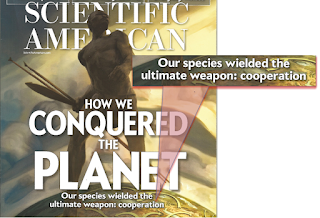This fits with my experience over many years working with my hay fever, which seems to have two interlinked dimensions:
- The basic hay fever seems to be a simple allergic response: when the grass is flowering my airways get irritated and blocked up.
- The bigger variable is now I respond from there on. When I get panicky about my constricted airways, then the physiological response in the back of my nose and throat is to swell up even more - which really blocks my breathing in a dangerous way.
Over the last ten years I have been deepening my yoga and other spiritual practice to enable me to recover more quickly from the panic response to my hay fever. At the core are a mix of acceptance and shift in focus to relax my bodily responses. This corresponds directly to freer breathing and thus reduces the impact of the hay fever. It is not fixing the initial allergic response but it makes my life a whole lot better.
What is important for me and in line with McGonigal’s point is that the initial problem is just the trigger, and my long term health depends not on stopping the trigger, but responding to it in a healthy and resilient way. As she advocates, it helps to say to oneself “this is my body helping me rise to this challenge.”
In scientific terms (one of the studies quoted by McGonigal), this amounts to “participants instructed to reappraise their arousal exhibited more adaptive cardiovascular stress responses – increased cardiac efficiency and lower vascular resistance – and decreased attentional bias. Thus, reappraising arousal shows physiological and cognitive benefits. Implications for health and potential clinical applications are discussed.”
Thanks to my wonderful coach Vanissar Tarakali for teaching me so much about how to befriend and listen positively to my own body, and for referring me to the TED talk.






